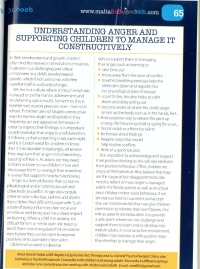In their development and growth, children often find themselves in stressful circumstances. Frustration is a challenging and critical component in a child's developmental growth, which if not overcome, will often manifest itself in outbursts of anger.
We live in a culture where so much emphasis is placed on performance, achievement and on delivering quick results. Sometimes this is experienced as peer pressure, even more so in school. If children are not taught constructive ways to express anger and frustration they frequently act out aggressive behavior in order to express their feelings. It is important to acknowledge that anger is a valid emotion. It informs us that something is not quite right and it is fundamental for children to know that it is acceptable to feel angry, otherwise they may turn their anger onto themselves, causing self-harm. As adults we may need to learn to listen to our children more and encourage them to manage their emotions in a way that supports healthy functioning.
Anger is a form of distress that combines physiological and emotional arousal and often leads to conflict. Anger also controls other emotions like fear, sadness and shame that children find difficult to cope with. Such a state of being influences their social and emotional well-being and has a direct impact on learning. When a child is in distress, it is difficult for him or her to learn. We need to teach them how to regulate their emotional state before they can be open to respond positively or to assimilate information.
Children thus need to develop skills that support them to manage their anger, such as learning to
– take time out
– move away from the zone of conflict
– breathe; breathing exercises help the child calm down and regulate his/her physiological state of arousal
– count to ten; this also helps to calm down and delay acting out
– become aware of where the child's anger tenses up the body, such as in the hands, feet…
– find a positive way to release the pent up energy, like bouncing a ball or going for a run…
– find an adult or a friend to talk to
– be honest about feelings
– imagine ways that would help resolve conflicts
– think of a good solution
It is important to acknowledge and support their positive thinking as this will also reinforce their positive behaviour. Often, children are angry at themselves as they believe that they are the cause of our disappointments. We need to reflect on how anger is managed within the family system as well as at school since children mirror adult behaviour. If we are not too hard on ourselves and accept that we sometimes fail then we give children permission to tolerate their own failures. Our role as parents and educators is to provide a safe space where we can challenge and support them to learn and to develop into mature adults. In a constructive environment, children may surprise us with positive ways they develop to manage their anger.
Anna Fenech holds a MA degree in Expressive Arts Therapy and is a Gestalt Psychotherapist. She is also trained as a Psychotherapeutic Counsellor with children and young adults. She works in different settings and also runs a private practice working with children and adults.

